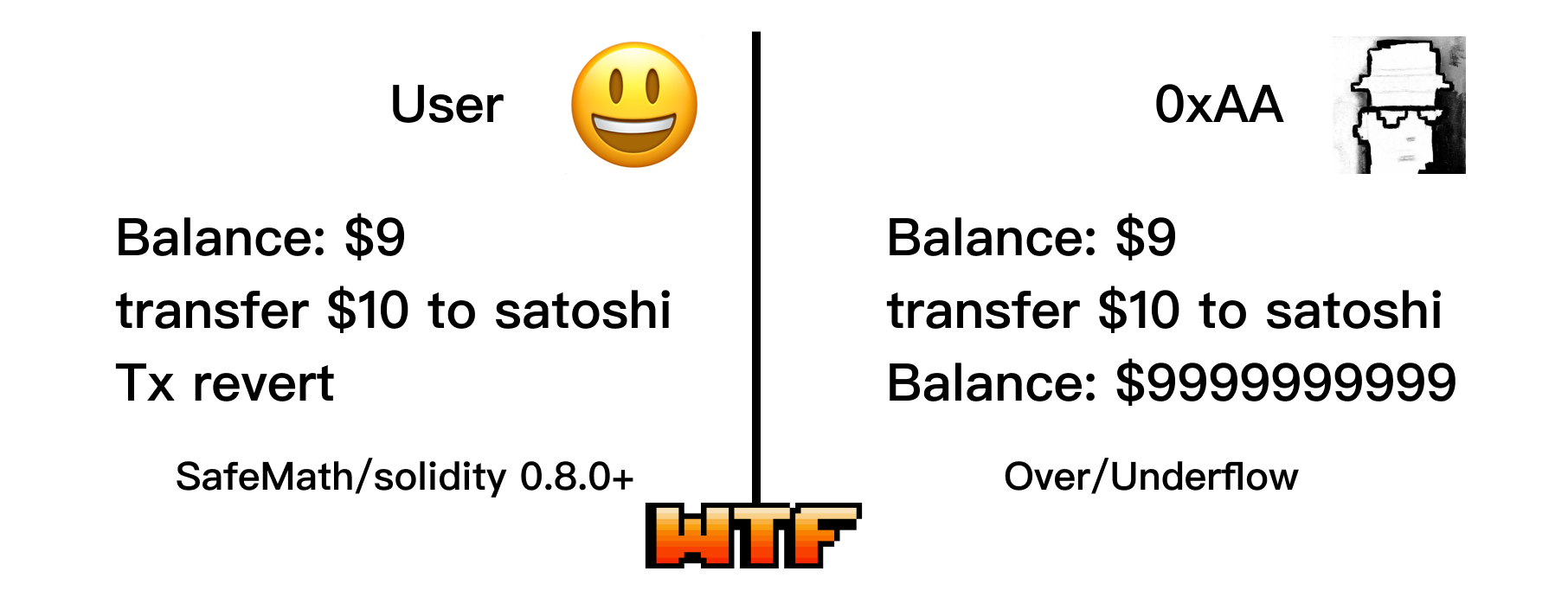WTF Solidity S05. Integer Overflow
Recently, I have been revisiting Solidity, consolidating the finer details, and writing "WTF Solidity" tutorials for newbies.
Twitter: @0xAA_Science | @WTFAcademy_
Community: Discord|Wechat|Website wtf.academy
Codes and tutorials are open source on GitHub: github.com/AmazingAng/WTF-Solidity
English translations by: @to_22X
In this lesson, we will introduce the integer overflow vulnerability (Arithmetic Over/Under Flows). This is a relatively common vulnerability, but it has become less prevalent since Solidity version 0.8, which includes the Safemath library.
Integer Overflow
The Ethereum Virtual Machine (EVM) has fixed-size integers, which means it can only represent a specific range of numbers. For example, a uint8 can only represent numbers in the range of [0, 255]. If a uint8 variable is assigned the value 257, it will overflow and become 1; if it is assigned -1, it will underflow and become 255.
Attackers can exploit this vulnerability: imagine a hacker with a balance of 0 who magically increases their balance by $1, and suddenly their balance becomes $2^256-1. In 2018, the "PoWHC" project lost 866 ETH due to this vulnerability.

Vulnerable Contract Example
The following example is a simple token contract inspired by the "Ethernaut" contract. It has 2 state variables: balances, which records the balance of each address, and totalSupply, which records the total token supply.
It has 3 functions:
- Constructor: Initializes the total token supply.
transfer(): Transfer function.balanceOf(): Balance query function.
Since Solidity version 0.8.0, integer overflow errors are automatically checked, and an error is thrown if an overflow occurs. To reproduce this vulnerability, we need to use the unchecked keyword to temporarily disable the overflow check within a code block, as we did in the transfer() function.
The vulnerability in this example lies in the transfer() function, specifically the line require(balances[msg.sender] - _value >= 0);. Due to integer overflow, this check will always pass. Therefore, users can transfer an unlimited amount of tokens.
// SPDX-License-Identifier: MIT
pragma solidity ^0.8.4;
contract Token {
mapping(address => uint) balances;
uint public totalSupply;
constructor(uint _initialSupply) {
balances[msg.sender] = totalSupply = _initialSupply;
}
function transfer(address _to, uint _value) public returns (bool) {
unchecked{
require(balances[msg.sender] - _value >= 0);
balances[msg.sender] -= _value;
balances[_to] += _value;
}
return true;
}
function balanceOf(address _owner) public view returns (uint balance) {
return balances[_owner];
}
}
Reproduce on Remix
- Deploy the
Tokencontract and set the total supply to100. - Transfer
1000tokens to another account, which can be done successfully. - Check the balance of your own account and find a very large number, approximately
2^256.
How to Prevent
For versions of Solidity before
0.8.0, include the Safemath library in the contract to throw an error in case of integer overflow.For versions of Solidity after
0.8.0,Safemathis built-in, so this type of issue is almost non-existent. However, developers may temporarily disable integer overflow checks within a code block using theuncheckedkeyword to save gas. In such cases, it is important to ensure that no integer overflow vulnerabilities exist.
Summary
In this lesson, we introduced the classic integer overflow vulnerability. Due to the built-in Safemath integer overflow check in Solidity version 0.8.0 and later, this type of vulnerability has become rare.